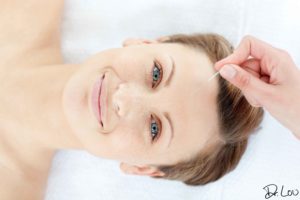What is “dry needling”, what is it for, who can perform it?
“Dry needling” is a somewhat common practice in Physical therapy and orthopedic offices, which uses acupuncture needles to reduce pain and tension in joints and soft tissue. Dry needling is a western medical approach, and not traditional Chinese medicine or acupuncture as most people know it.

What is dry needling and what is it used for? Who does it? Who is the best professional to perform the procedure? Do your homework!
Dry needling is a buzzword/legal term typically used by PT’s and other practitioners, most often who are not traditionally trained in Chinese medicine. Any acupuncturist or chiropractor licensed to perform acupuncture, can apply the same technique as “dry needling,” it is just a pain based application of acupuncture needles. For the Maine Association of Acupuncture and Oriental Medicine (MAAOM) stance on “dry needling”, click HERE
In the state of Maine, chiropractors with 200+ additional hours of training and testing may receive a certification in what is called “chiropractic Acupuncture.” In other parts of the country, 200-300 hours allows them to be certified in “Acupuncture.”
Chiropractic acupuncture is a legal term to be used to “identify” a chiropractor performing/licensed to practice acupuncture. The training is a stripped down version of TCM and acupuncture school – meaning that all the western medical sciences, human physiology, pathology, etc, which have been studied at a doctoral level in chiropractic school, can be “skipped” in their acupuncture training because it’s been studied already. The training is like a condensed, but thorough, training in acupuncture. Chiropractors receive over 4,400 hours of graduate school training to complete their “Doctor of Chiropractic” degree.
I’m not sure what the exact dry needling protocol of study for PT’s is, but I have been told that additional training and certification is required. In Maine, chiropractors are not allowed to use the term “dry needling” without having their chiropractic acupuncture certification from the state licensing board. Sometimes these words like “dry needling” and “chiropractic acupuncture” are legal word configurations so that they don’t step on anyones professional toes, and to designate who and what they actually are, and do. For understandable reasons, acupuncturists don’t want others claiming to do the same that they do, without the exact same education. So, again, even “chiropractic acupuncture” is a legal rewording based on specific training.
How Much Does It Cost?
Dry needling can be expensive as a form of trigger point therapy. The cost depends on the provider. Trigger point therapy, similar to a deep tissue massage, is faster than dry needling and it is just as effective. Trigger point therapy is typically 1/2 to 1/3 the cost of dry needling. Much more affordable.
Dr. Lou is certified to perform “Chiropractic Acupuncture” in the state of Maine, which includes “dry needling” also known as “trigger point acupuncture.” Dr. Lou also lived in Beijing, China for nearly 2 years studying Chinese language and cooking. While studying cooking, his teacher incorporated the principles of Traditional Chinese Medicine into his studies. Dr. Lou’s chiropractic acupuncture training was with Dr. Lawrence Beem in Kansas, City, Dr. David Yoo formerly of Kansas City, and Dr. Zev Meyerowitz Sr. in Holden, Maine. Dr. Lou is required by law, to maintain his chiropractic acupuncture license, to have yearly hours of continuing education specific to the practice of “chiropractic acupuncture.”
